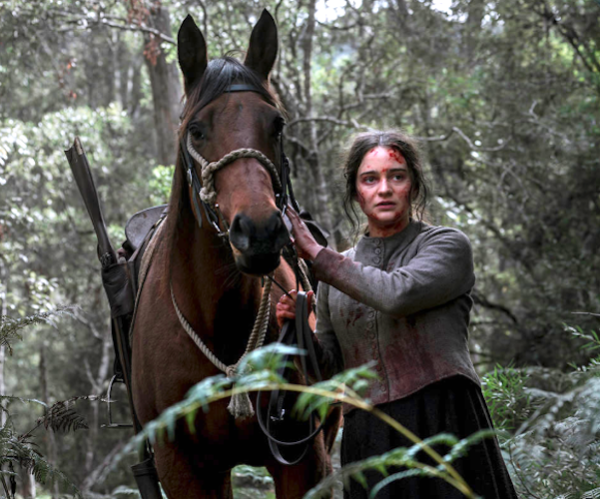Film Review: “The Nightingale” — Song of the Powerless
By Tim Jackson
The Nightingale delivers an indelible vision of inhumanity perpetuated by colonialism and white privilege.
The Nightingale, directed by Jennifer Kent. Now screening at the Kendall and Coolidge Corner Theaters
Jennifer Kent’s The Nightingale is set in the geographical cul-de-sac of Tasmania in 1825, where 21-year-old Clare (Aisling Franciosi) has completed a 7-year sentence for an unnamed petty crime. She resides, as a sort of indentured servant, on the island with her husband and infant daughter. We first see her paraded out to sing before a drunken group of soldiers. Her angelic voice barely stifles their lechery, the loudest lout being Lieutenant Hawkins (Sam Claflin), the reprobate who is in charge of these bedraggled troops. Hawkins, Clare’s abuser, refuses to release the woman from servitude, despite pleas from her husband. Flush with power and liquor, the cowardly Hawkins seems to enjoy brutalizing the family. Meanwhile, Hawkins’ expected promotion to captain is threatened and he is forced to make his way through the jungle town of Launceston to plead for his commission. Bent on revenge, and seeking justice, Clair conscripts an Aboriginal tracker Billy (Baykali Ganambarr) and, with a single horse, she doggedly sets off in pursuit of the lieutenant.
As she did with her horror thriller The Babadook, director Jennifer Kent knows how to get under the viewer’s skin. The Nightingale is — at times — a self-consciously punishing film. Cruelty towards powerless inmates is exceeded only by the horrors heaped upon the indigenous tribes. In Tasmania during the early nineteenth century, rape, murder, and enslavement are part of a strategy to eradicate its native people. Retribution drives the narrative, but there is a broader political point being made. The pace is relentless and the chaos of life on the island is recreated with careful attention to detail. The treatment of the Aborigine people and of women in general is conveyed through deeply haunting images. Kent not only carefully recreates the period’s clothing and interiors, but shot the film on locations around Tasmania with an aboriginal advisor. The Irish songs “Nightingale” and “Siuil A Run” (Walk my Love) are sung in both English and Gaelic — both feature plaintive lyrics. The dialogue is delivered in English, Gaelic, and the native tongue of Palawi Kani, (which translates as ‘Tasmanian Aborigines speak’). The credits for the production are filled with the names of locals. Kent’s respect for the culture, along with her brave decision to concentrate on the period’s vicious (and casual) sadism, pays off. The Nightingale delivers an indelible vision of inhumanity perpetuated by colonialism and white privilege.
Franciosi, Ganambarr, and Claflin are equally convincing. Franciosi’s Clare ranges from adorable to helpless, steely to obsessed. Ganambarr, a first-time actor and dancer from Arnhem Land, one of the five regions of the Northern Territory of Australia, fits his role as Billy perfectly. Claflin’s lieutenant has the kind of smarmy good looks that make the figure all the more despicable. The remaining cast members are equally compelling; they are a ragged crew trudging through the underbrush, struggling to keep some sense of pride and decency while under the control of a psychotic leader.
As their pursuit becomes more daunting, Clare and Billy inevitably probe deeper into themselves. A white woman and a black man at that time inhabited different worlds. Inevitably, under pressure, they are forced to recognize each other’s humanity. But their journey is no Australian Walkabout. Theirs is an uneasy relationship generated by a near-impossible quest. They slowly acknowledge the courage that each must find to deal with ongoing oppression. To its credit, The Nightingale does not offer a feel-good resolution to intractable problems. There is no escape from the world these lost souls inhabit. One leaves this historical drama feeling that things haven’t changed nearly enough.
Tim Jackson was an assistant professor of Digital Film and Video for 20 years. His music career in Boston began in the 1970s and includes some 20 groups, recordings, national and international tours, and contributions to film soundtracks. He studied theater and English as an undergraduate, and has also has worked helter skelter as an actor and member of SAG and AFTRA since the 1980s. He has directed three feature documentaries: Chaos and Order: Making American Theater about the American Repertory Theater; Radical Jesters, which profiles the practices of 11 interventionist artists and agit-prop performance groups; When Things Go Wrong: The Robin Lane Story, and the short film The American Gurner. He is a member of the Boston Society of Film Critics. You can read more of his work on his blog.


What in this movie says white privilege? An Irish family living in slavery is privilege. My family immigrated to the US from Ireland and Wales and were treated worse than piss ants. Take your politically correct bullshit out of this article. The movie was a good depiction of the time and age it portrayed; leave out the racist comments. Thank you
What in this movie says white privilege. Are you joking? Did you even watch the movie in question? Or is it just blatant ignorance from your part??
“Treated worse than piss ants” but allowed to live, work, shop, use public transport, to be offered a seat at the table for instance in reference to the film . And be treated in such a way that is specific to the colour of their skin. White privilege existed in the worst extremes you could even fathom, whether you like or understand it outside your very blinkered view or not. You cannot just band groups together as if they have the same history because they both may at one time have been treated with the same ignorance.